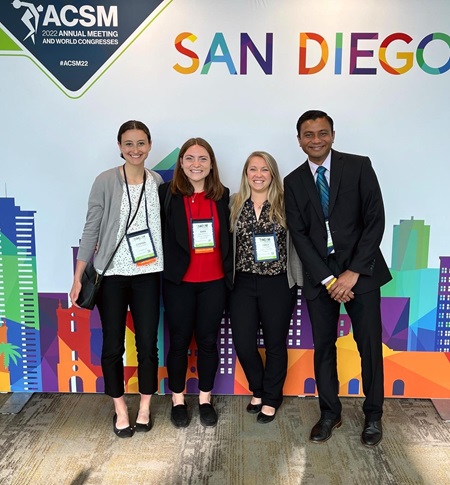Emily F. Blake |
Nov.
14, 2022
 L-R: Cynthia Weiner, Sara Mascone, Emily Blake, Dr. Sushant Ranadive
L-R: Cynthia Weiner, Sara Mascone, Emily Blake, Dr. Sushant Ranadive I presented an abstract at the ACSM Annual Meeting for the first time this June. The morning of my poster session, as I walked through the giant room filled with research posters from labs all over the country (and even some international labs!), I was surprised to see a student already standing by my own. “I’ve been waiting for you,” they said. I hadn’t expected anyone to be even more excited than I was to talk about the project that I had been working on, but here they were. Throughout the rest of the poster session, I had the opportunity to speak with numerous students as well as some lab directors/PIs. What started out as something I had nervously anticipated for weeks turned into an enlightening and ultimately fun experience.
There are many benefits to presenting your research at a conference, one of the largest being the chance to connect with other researchers/clinicians within and outside of your discipline. When I started my PhD, I would hear my advisor and others in my lab talk about each paper we discussed with what seemed like an inherent familiarity with the authors and the work their lab was doing. I thought to myself, “how will I ever remember all of these details?” However, once I started attending conferences and meeting some of the individuals whose work I was reading, it suddenly became a lot easier. It’s an incredible opportunity to ask the questions you have or discuss your own research ideas with the scientists whose research formulated the basis for those ideas. Moreover, there are a ton of networking opportunities. During the poster session at the ACSM Annual Meeting, another student in my lab presented her research to a faculty member who was looking for a potential postdoctoral student.
Another critical component and huge benefit to presenting is gaining the skills to talk about your research to a variety of audiences. Being able to share your knowledge in a way that is both understandable and meaningful to a diverse group of scientists, clinicians and researchers as well as a lay audience is perhaps the most important skill for an impactful career in academia, research or industry. While you will put in a lot of work and maybe a little more stress than you’d like into preparing your presentation, the skills and opportunities (and maybe inspiration for your next project/dissertation!) that you gain as a result are worth it.
Want more information about presenting at the 2023 ACSM Annual Meeting in Denver, CO next year? Learn more here!
Emily F. Blake is a member of the ACSM Consumer Outreach Committee and a Ph.D. student at the University of Maryland, College Park. Her research in the UMD Human Integrative Physiology Lab focuses on the role of sex hormones and reproductive aging in the relationship between inflammation and vascular function. When she isn’t in the lab, she likes to play soccer and hike with friends and hang out with her cats.